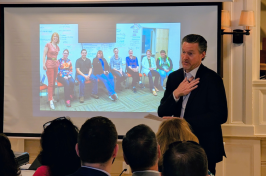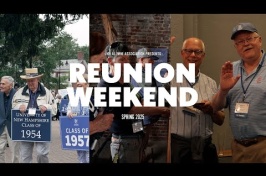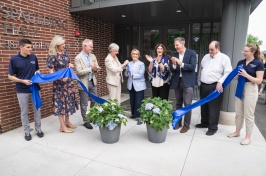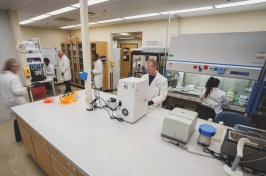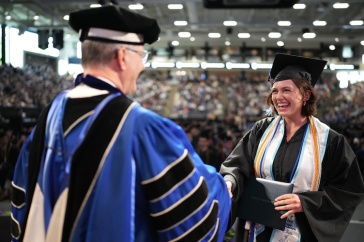|
|
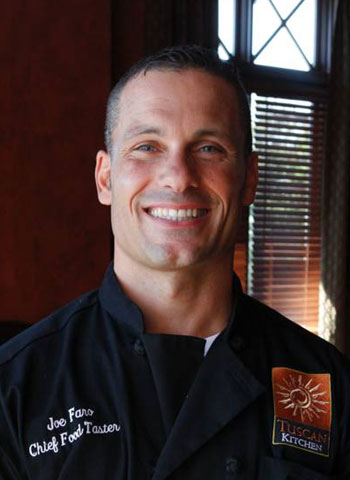
For Joe Faro '91, the future began taking shape in an entrepreneurship class during his senior year at UNH. Until then, he knew food was his passion. He grew up working in his parents' bakery in Haverhill, Mass; he had even begun creating his own handmade pasta. Like most college students, however, he had no idea where it would take him.
Assigned to write a business plan, Faro conceived an idea for a company, Joseph's Gourmet Pasta and Sauces, which he entered in the Whittemore School Holloway Prize Innovation-to-Market Competition. "I intended to bring it to a bank, borrow $1 million and retrofit an old shoe factory," Faro says.
Faro finished second and graduated into the 1991 recession. He took his plan to 15 banks before one in Lawrence, Mass., found "creative collateralization" to launch his business. But initially, Faro's products were not well received.
"I didn't know what I was doing," Faro says. "I had a passion for food—for creating the products—and a vision, but no nuts-and-bolts business knowledge." As his funding ran out, Faro was forced to take a second look at his offering. He also had to take kitchen and catering jobs at some of the restaurants he was trying to sell his products to.
Being in the trenches taught Faro about food. "I started to learn to be a chef," he says. He fine-tuned his palate and began creating chef-worthy sauces. "I started with a sauce with lobster meat, sherry, some shallots and a little bit of cream," Faro says. "I'd boil it down and pipe it into ravioli."
It was labor intensive: Faro would stamp circles in a sheet of pasta using a number 10 can and pinch the folded edges with a fork before adding the fillings. The new creations, however, were a hit with Boston-area hotels and restaurants. Faro finally had a unique product a cut above his competitors.
Faro described his early marketing strategy as "me sneaking in the back door of every kitchen I could get into and dropping a box before the chef could throw me out." He'd pack the pasta into the back of his station wagon, using a sleeping bag to keep the boxes cool, and buzz all over Boston. He'd leave the car running, hazard lights on, and dart into restaurants. He'd drop a box, give his 22-second spiel, and run back out. It was a stressful approach. "Security at the Ritz-Carlton would chase me all over the building," Faro says. He also lost a van, packed with his products, when it was stolen in the North End. Still, according to Faro, anybody who tried the pasta would call back. "That's how I started to build the business," Faro says.
Significant growth, Faro knew, required automation. By then in his own factory, Faro retooled his old ravioli mixer and tweaked production methods more than 100 times before finding a continuous way to inject large chunks (lobster, chicken, mushrooms, etc.) into thin pasta—two qualities that made his ravioli famous. "Our claim to fame was 50 different shapes of ravioli with 500 different fillings," Faro says. The company also made cannelloni, lasagna and custom pastas.
Automation increased output from 200 handmade pounds a week to 200,000 pounds a day, enabling Faro to sell to wholesalers and top national chains. After landing his first Olive Garden order in 2000, Faro quickly added clients such as Bertucci's, Carrabba's, Macaroni Grill and California Pizza Kitchen.
"The business was a living, breathing machine. It was my other baby, and I probably spent more time with it than my real baby."
By 2005, Joseph's Gourmet Pasta and Sauces had grown from $200,000 in annual sales to $60 million. It had become a 24/7 operation with more than 200 employees. "I loved every piece of it and everybody in it," Faro says.
But being involved in each aspect had Faro working 80-hour weeks and fielding phone calls at 2:00 a.m. "The business was a living, breathing machine," says Faro. "It was my other baby, and I probably spent more time with it than my real baby."
Faro realized he had to retool the business to run without him, or sell it. In 2006, he sold to Nestle Prepared Foods. It was the hardest decision of his life. "For one conditioned to persevere, it almost felt as though I'd quit," Faro says. "Money wasn't the issue: the train had finally arrived at the station and I had to get off."
After a brief retirement, Faro began a new venture. He purchased seven Depot buildings in downtown Salem, N.H., to create an artisan-Italian restaurant and associated businesses. Tuscan Kitchen opened in November 2010. Faro is now at work on Tuscan Market next door to the restaurant, where customers can buy fresh foods, including breads, pastas, mozzarella and desserts, made right in front of them.
Tuscan Villa, which will include a small park and other boutiques, is the culmination of all of Faro's entrepreneurial experiences, his many trips to Italy and his lifelong passion for food. "It's a very different business: It's five minutes from my home, it's starting from the beginning again, which to me is what I enjoy most," Faro says.
For young entrepreneurs who would like to replicate Faro's success story, he has two pieces of advice.
"Mentally prepare yourself for the rejection and adversity you'll face through your entire business career," he says. "There's a pothole one every street, but there's always a workaround and a way to persevere."
And he also advises to not be hasty in changing your vision: "Adapt to the environment, but stay true to what you do."
Originally published by:
UNH Magazine
-
Written By:
Andrew Leibs '87G | Freelance Writer










